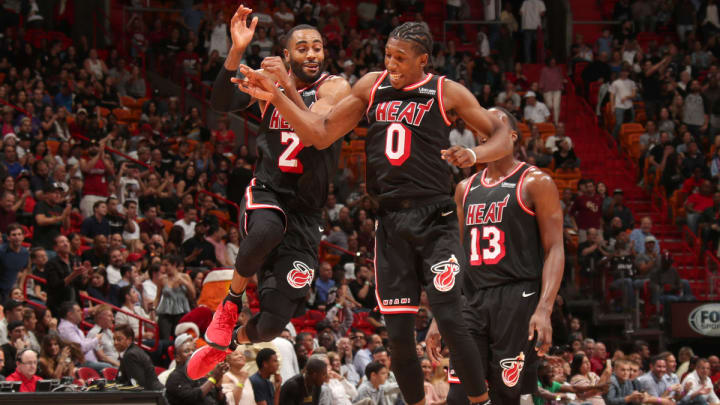The Makeshift Heat Refuse to Roll Over

It's a long season, and the Miami Heat chug along. Already they've endured losing skids and staggering injuries—to Hassan Whiteside, to Goran Dragic, to Dion Waiters, to James Johnson, and to Justise Winslow, often several at once—to say nothing of a dispiriting start. Motor isn't generally a problem in Miami, but ignition has seemed to be an issue. The starting lineup lost its minutes regularly. The early schedule dished out expected losses to quality playoff opponents, but the Heat themselves were responsible for botching certain winnable games in spectacular fashion. Massive losses to the Pacers and Knicks looked like bad omens, written by that cardinal sin of Heat culture: a failure to compete.
Miami, through makeshift lineup after makeshift lineup, has since stabilized. The post-LeBron era of Heat basketball has been defined by both its shortage of elite-level talent and its capacity to compensate. The 2016–17 Heat famously started the season 11–30 before then going 30–11. This year's team (18–16 through Thursday) isn't quite so dramatic, though in every game it still faces the same fundamental flaws. They make do. Erik Spoelstra cobbles together a nightly rotation of the least-injured contributors he can, and the Heat plug away at their predicament with admirable resolve.
In the first two months of the season, the Heat spent all of four days as a winning basketball team. Last week they finally broke through, inching into an unglamorous eighth place in the Eastern conference. Whatever the Heat win, they win on the grind. Waiters became a cartoonish sort of avatar for Miami's comeback campaign last season, but in truth they're better represented by the likes of Josh Richardson or Tyler Johnson—workers who have built careers for themselves from the NBA fringes.
There's More to Dion Than Waiters Island
Fittingly, Richardson has come into his own just as the Heat have found themselves. The former second-round pick has been defending at an All-NBA level for years, harassing any perimeter player who dared dribble in his general vicinity. What seemed like a modest 3-and-D trajectory, however, has been somewhat complicated by the fact that Richardson has averaged 17.3 points over Miami's last 10 games, leading the team in scoring during a 7–3 surge.
“He’s becoming somebody new and more dangerous,” Spoelstra said, per Anthony Chiang of the Palm Beach Post. That much seems inarguable. The four highest-scoring performances of Richardson's career have all come this month, with Whiteside out (before returning on Tuesday), Waiters floundering, and Dragic ailing. We've seen Richardson try his hand at running an offense previously to underwhelming result. Richardson still isn't the kind of creator a team would love to run all of its packages through, but selective utility goes a long way. While he won't make magic out of a high pick-and-roll, Richardson can score capably out of dribble hand-offs.
Wayne Ellington, too, has been quietly excellent, shooting his way into a rotation that didn't seem like it would have much room for him this season. The Heat have no shortage of wings. Richardson, Johnson, Waiters, and Winslow each came into the season expecting significant roles, most of which have been fulfilled. Various injuries, however, left the door open for Ellington to play the fifth-most minutes on the team to date.
The Heat are an impressive sixth in the league in three-point percentage and fourth in three-point rate (the percentage of a team's shots that come from beyond the arc) because of Ellington. There are other quality shooters on the team but none this good; Ellington's career-best 43% beyond the arc is competitive with the best shooters in the league, making him incredibly valuable to a laboring Heat offense.
Teams without a standout shot creator have to churn their way into productive possessions, something that just isn't feasible without the physical space for one action to build into the next. A shooter like Ellington—who is both exceedingly capable and incredibly eager—helps provide it. Miami scrapes by. The Heat have to defend well to win and generally do, a credit to their collective discipline. Whiteside's return should help expand their margin for error somewhat, though there's no avoiding the reality that every game will be a battle. Opponents may have the kinds of stars who make the game look easy. Miami does not.
The ceiling will always be within view for a team like that, but the Heat don't care—they'll work relentlessly to build layer upon layer, raising their floor an inch at a time until their heads bump. It's an admirable enterprise. That same ethos led Miami's scouts to scrounge up talent from every possible avenue in the construction of this roster. A lesser program might have withered under the injury-created need to field 10 different starting lineups in 34 games. The Heat merely shrugged, adjusted their depth chart as necessary, and went to work.

Rob Mahoney is an NBA writer dedicated to the minutiae of the game of basketball, its overarching themes and everything in between. He joined the Sports Illustrated staff in 2012.